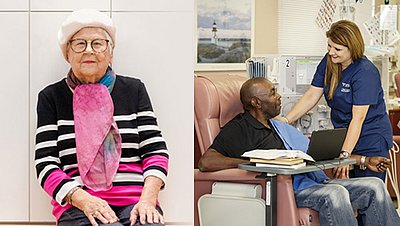Our patient stories and company features.
An Introduction to the Renal Research Institute
Founded in 1997 as a joint venture between Beth Israel Hospital, Manhattan, and Fresenius Medical Care (FME), the Renal Research Institute (RRI) is a world-renowned innovation hub headquartered in New York, New York, and is wholly owned by FME. Its mission is to improve kidney patient outcomes through research.
Currently led by Peter Kotanko, MD, FASN, RRI is uniquely positioned to accelerate the pace of scientific discoveries and their translation into applied medicine. RRI conducts research into advanced fields such as artificial intelligence, metabolomics, and proteomics. Regarding translational and clinical research, RRI’s strength is its end-to-end study capability, including ideation, protocol development, fulfilling regulatory requirements (e.g., protocol submission to institutional review boards), study execution, statistical analysis, publication of results, generation of intellectual property, and clinical implementation support.
Further, RRI is a founding member of the MONitoring Dialysis Outcomes (MONDO) initiative. According to Dr. Kotanko, MONDO is “one of the world’s largest transcontinental dialysis databases — it comprises treatment-level data from over 40 countries on six continents over a period of two decades. Analysis of MONDO data has generated fundamentally novel insights into the biology of dialysis patients.”
As the group continues to grow, RRI consistently seeks new partnerships to help expand and accelerate renal research. Institutions and individuals interested in collaborating with RRI are encouraged to contact the group directly.
Forward-Thinking Research
Research and innovation are at the core of RRI’s mission. The breadth of current research and the opportunity for future projects are vast. “RRI’s research spans from multiomics to mathematical modeling, epidemiology, early device development and testing, to clinical research studies,” explains Kotanko.
One research project Kotanko is particularly excited about is the development of virtual clinical trials, or VCTs. According to Kotanko, VCTs use “mathematical ‘twins’ of patients [that] are subjected to different treatments. The results of such VCTs inform the treatment algorithms, some of which are used in 150,000 dialysis patients.”
Publication date: August 2024




